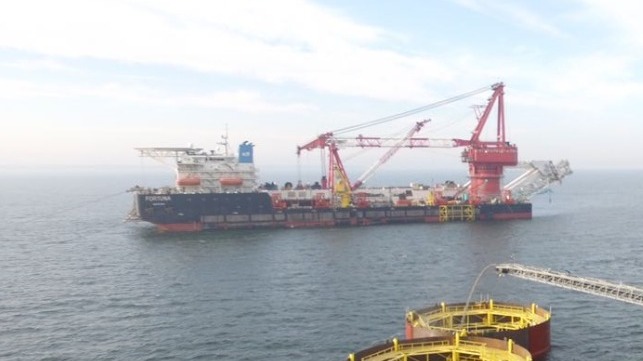Blinken Warns Germany of Sanctions Risks for Nord Stream 2

At a NATO ministerial summit in Brussels on Tuesday, U.S. Secretary of State Antony Blinken made clear that sanctions are on the table as a mechanism for addressing European participation in the nearly-complete Nord Stream 2 natural gas pipeline.
"We've had a number of conversations [with the German government] already, and I know we'll have a lot to cover . . . and I suspect that Nord Stream 2 will come up in the conversation. President [Joe] Biden has been very clear in saying that he believes that the pipeline is a bad idea - bad for Europe, bad for the United States," said Blinken. "It has the potential to undermine the interests of Poland, Ukraine and a number of other close partners or allies, and I'm sure I'll have an opportunity to reiterate that - along with the law of the United States, which requires us to sanction companies participating in the efforts to complete the pipeline."
Gazprom's Nord Stream 2 pipeline would deliver Russian natural gas directly to Germany's Baltic Sea coast, bypassing the existing pipeline network through Eastern Europe. U.S. lawmakers are concerned that Russia could use the new route to supply Western Europe while shutting off the gas (and lucrative pipeline transit fees) for Ukraine - a bargaining tactic that Moscow used in 2006 and 2009. Germany strongly favors the pipeline's construction.

that matters most
Get the latest maritime news delivered to your inbox daily.
The Protecting Europe’s Energy Security Act of 2019 requires the administration to regularly report to Congress on the identity of Nord Stream 2's pipelay vessels, underwriters, insurers and testing and certification providers. In a status report completed in February, the Biden administration did not include the names of key vessels and companies with known involvement in the construction of Nord Stream 2, according to Sen. Jim Risch (R-ID) and others with access to the document.
The abbreviated list has raised expectations that the White House will protest the pipeline's construction without using sanctions to block it. At the time, Blinken was said to oppose the use of unilateral sanctions against participants, preferring diplomacy instead. In recent weeks he has taken a harder tone in public, describing the pipeline as a "Russian geopolitical project intended to divide Europe and weaken European energy security."
